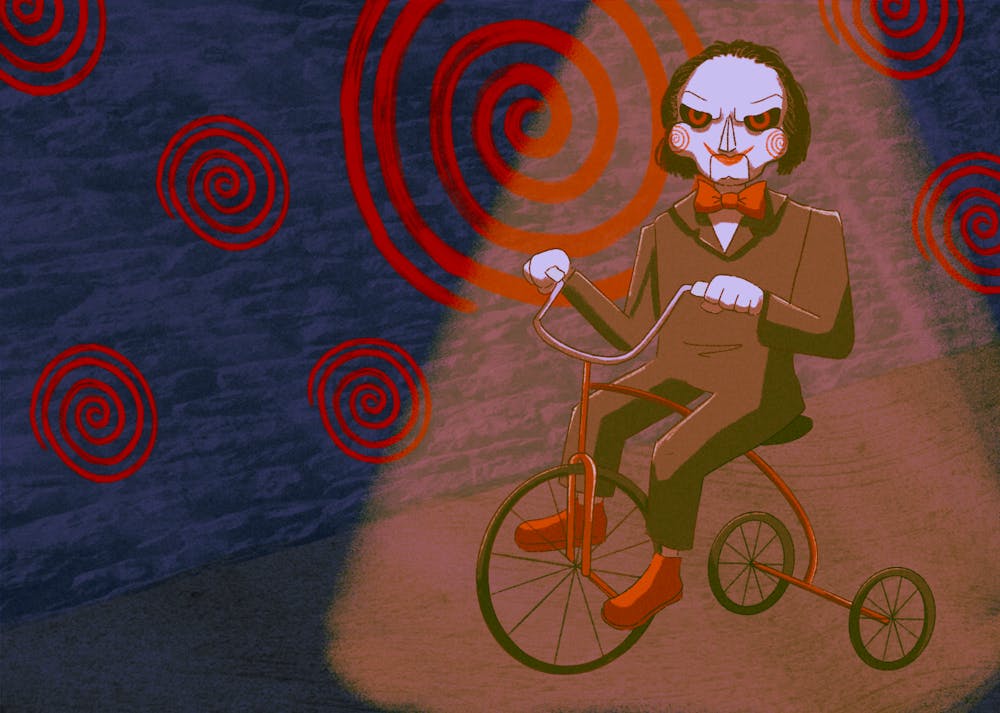Blood, guts and deadly mind games — when it comes to the horror genre, few franchises have managed to dominate modern culture quite like the “Saw” series has.
Created by filmmakers James Wan and Leigh Whannell, what started as a grungy, low-budget mystery film about two guys locked in a bathroom by a serial killer went on to become one of the most successful (and controversial) horror franchises of all time.
Now, the blood-soaked series is set to continue in this year’s “Spiral: From the Book of Saw.” Directed by franchise veteran Darren Lynn Bousman and based on a story by comedian Chris Rock (who also stars in the film), this new entry is set to follow a fresh cast of characters who must hunt down a new killer — one whose horrific games mirror those of the franchise’s namesake villain, Jigsaw.
With a 10th film already in the works, the series continues to rage in popularity despite its macabre themes and tones.
The central premise of the series surrounds John Kramer (played by Tobin Bell), a civil engineer who, after a series of personal tragedies and a failed suicide attempt, gains a newfound appreciation for life. Believing most people are ungrateful to be alive, John becomes Jigsaw, a serial killer who places his victims in elaborate death traps in order to test their will to survive.
Despite the reverse bear traps that rip peoples jaws apart and pits full of syringes, Jigsaw’s traps are survivable, but deeply depraved.
With this graphic violence, it’s no surprise the series has long been the subject of critical scorn. Some writers have even gone so far as to label the series “torture porn,” a title that, while catchy, doesn’t sit right with some, such as horror writer Jeff Whitehead.
“In some respects, I think that the violence really talks about fear and it really talks about trauma,” Whitehead said. “Yes, they’re very explicit, but that also scares a lot of people. You could put yourself in that position.”
For Whitehead, who is the chief operations officer for the George A. Romero Foundation in Pittsburgh, the series is not merely a vehicle for watching creatively gruesome deaths, but a deeper story rooted in something even more terrifying — the post-9/11 political landscape.
When the series began production, the world seemed to be in a state of turmoil. George W. Bush had just become president, America was reeling from the events of 9/11, and many citizens suddenly became aware of how truly dark and violent the world could be.
“If you take a look at the first ‘Saw’ being made during the Bush administration, you’re taking a look at terrorism,” Whitehead said. “It’s a time of war, it’s a time of terrorism, it’s a time of real social strife, and it lasted for a very long time.”
In the world of horror, filmmakers began leaving behind the classic slasher stories that “Friday the 13th” and “Scream” were built on and embraced brutality. While films like Eli Roth’s “Hostel” and Rob Zombie’s “The Devil’s Rejects” became horror mainstays as a result, it was “Saw” that truly set the stage for this new era of horror.
What set “Saw” apart was the twisted morality at the heart of the franchise’s villain. Despite being a serial killer, Jigsaw was adamant he didn’t kill people, but rather put them in positions where they had to decide whether to live or die.
“Those who don’t appreciate life do not deserve life,” Jigsaw says in the second film.
Jigsaw's philosophy is one rooted in the idea of salvation and enlightenment from suffering. A concept film scholars have noted as running parallel to philosophies of politicians like Dick Cheney.
Over the course of "Saw," we see Jigsaw develop from a lone killer to a prophet, of sorts, taking on disciples who share his values. Despite dying in the third film, Jigsaw is felt through the remainder of the films as his apprentices carry on his sick work.
So what’s next for the franchise?
The trailer for “Spiral” seems to indicate a new killer has emerged, one that carries on Jigsaw’s modus operandi but adds the caveat of targeting police officers exclusively.
Gone is the iconic, white-faced puppet of the original movies, and in its place the “Spiral Killer” now utilizes a marionette of a pig dressed as a sheriff — a symbol that should be obvious to anyone familiar with the common practice of referring to cops as “pigs.”
If the first seven “Saw” movies were reactions to Bush-era politics — with the exception of 2017's “Jigsaw” with Trumpian motifs — “Spiral” appears to be a reaction to the Trump era with Chris Rock’s Detective Banks at the center of the conflict.
While we won’t know exactly how this will play out until “Spiral” comes to theaters on May 14, this new entry looks as though it's set to usher in a new age for the “Saw” series.
Reach the reporter at nmdelga3@asu.edu and follow @DelGoada on Twitter.
Like The State Press on Facebook and follow @statepress on Twitter.
Continue supporting student journalism and donate to The State Press today.




